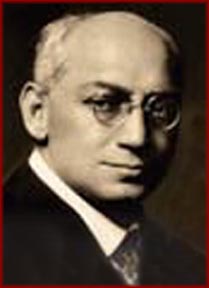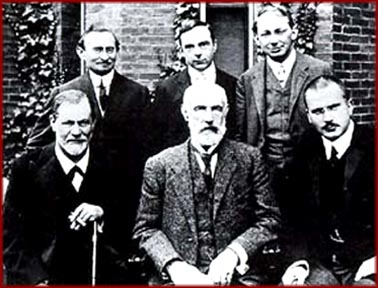




Sandor Ferenczi
Sandor Ferenczi has been called "the Jewish Crown Prince of Psychoanalysis."[1] If Freud was the father of psychoanalysis, some say that Ferenczi was the mother.[2]
He was born Sandor Fraenkel (the family name was Hungarianized to Ferenczi) in Miskolc on July 7, 1873, one of twelve children of Baruch Fraenkel [Bernat Ferenczi, 1830-1889] and Rosa Eibenschutz. His father had emigrated from Krakow, Poland to Hungary in order to escape the pogroms.[3] A fervent patriot, Bernat Ferenczi had served in the Hungarian army during the 1848-49 war of independence from Austria. For most of his life, he ran a combination bookstore, lending library, publishing house, and speakers' bureau that was a center of cultural life in Miskolc and through which his children were introduced to the city's intellectual leaders. After his death, his wife Rosa took over the business and was successful enough to ensure that all of their sons were able to undertake the careers of their choice.
"Studying the life of the Fraenkel-Ferenczi family reveals fascinating insights into an aspect of social change within the Monarchy of the time. The young Jew [Bernat Fraenkel-Ferenczi], who had escaped from Poland and went on to become a true Hungarian patriot, contributed to the country's bourgeoisfication and cultural development, and then the boy [Sandor Fraenkel-Ferenczi] who went on to create something of lasting importance in the world of science. The Hungarian nationalism of the 19th century accepted and supported Eastern European Jewish immigrants, with a certain measure of tolerance, who were willing to become Hungarian, offering them a chance at social betterment and promoting social mobility. A significant part of what was a modest-sized middle class consisted, by the turn of the century, of assimilated Jews. This tolerance, however, lasted only for as long as it was politically expedient for the purposes of improving the country's 'ethnic composition': after the Trianon borders were drawn, antisemitism became increasingly prevalent."[4]
Ferenczi received his medical degree in Vienna, served as an army doctor, and then worked in a hospital in Budapest. By 1900, he had opened a private practice in neurology and psychiatry. He was a prodigious writer and, before 1908, had published some 98 medical articles, case studies, and book reviews. His principal interests at that time were "unconscious and semi-conscious states --- hypnotism, dreams and occult phenomena --- but he was also interested in neurological diseases, psychological experimentation and links in the psyche to sexuality." [5]
In 1908, Ferenczi met Sigmund Freud and became committed to psychoanalysis. Freud referred to Ferenczi as "my dear son" and the two maintained a stormy personal and professional relationship. Ferenczi is said to have "played a heroic part --- second only to that of Freud--- in building psychoanalysis into a branch of science."[6] His "pioneering contributions to analytic therapy include: the introduction of empathy into the analytic relationship; the curative function of the relationship in the analytic encounter; the role of activity in analytic therapy; the importance of non-interpretative behavior by the analyst; the function of the experiential and emotional dimensions in analytic therapy; analyst self-disclosure; and mutual analysis." [7]
In 1919, Ferenczi married Gizella Altschul Palos, with whom he'd long had an intimate relationship. They had no children. Sandor Ferenczi died in Budapest in 1933.

Front (l-r): Sigmund Freud, Granville Hall, Carl Jung
Back (l-r): Abraham Brill, Ernest Jones, Sandor Ferenczi (1909)
Credits: Text and page design copyright © 2008 by Helene Kenvin. Page design by Helene Kenvin. All rights reserved.